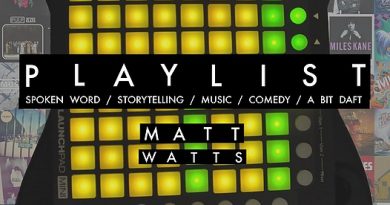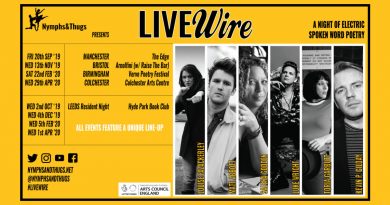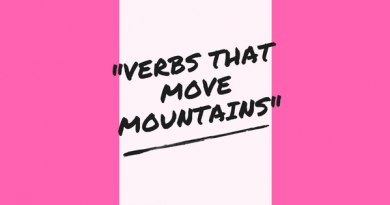The Challenges of Reviewing Spoken Word
-by Claire Trévien–
Since launching Sabotage Reviews nearly 8 years ago, reviewing spoken word has been at the core of our mission. In that space of time, spoken word has continued to grow and diversify in wonderful ways, from the meteoric rise of Kate Tempest and Hollie McNish, to the boundary-pushing of Hannah Silva, Ross Sutherland, and more. And yet, outside of big-ticket events, reviews of spoken word performances are still far and few between.
We’ve been trying to redress this balance, but reviewers for spoken word are difficult to find. They are much more difficult to find than reviewers of published works certainly, and when volunteers do appear, some can take on the qualities that Benjamin Solah, over in Melbourne, describes:
So far, most of the reviews we’ve published have been wholly positive. Many of the reviews have been written by friends of the artist, or artists find someone they know to review the work. This isn’t in line with other publications that require minimal correspondence between the producer of the work and the reviewer, so it’s unbiased and as objective as possible. We’ve tried to address this by asking that reviews go through us. This is extra hard for us to avoid because most poets within the scene know each other.
“Friendly” reviews take on more of an explanatory role, almost advertorial in nature, describing a work they like and highlighting it for the rest of the community to engage with.
It’s nice to know that this isn’t a problem unique to us, though we are lucky to count in our roster insightful reviewers and editors who don’t fall prey to this trap.
Now, to be clear, most of our reviewers of published work are also writers themselves. Unlike spoken word reviewers however, they can review work created by authors geographically distant from themselves – people they are unlikely to bump into at the pub or in Boots. Some of our reviewers deliberately choose works published in different countries for that very reason: to remove bias.
Spoken Word and the physical proximity of a performance gives its reviewers no such luxury.
While it is an expanding world it does remain a tight knit community and there is a fear that a slightly negative review could lead to the author no longer being welcome at local gigs or getting booked for events. These are not inconsiderable pressures, particularly when you are starting.
To some extent, they are right to worry, the lack of a strong reviewing culture around spoken word means that many artists can be understandably sensitive about even balanced reviews. When you don’t have a large digital footprint for your spoken word work, the last thing you want is for the dominant link to be a tepid review.
And yet, we owe it to spoken word to take it seriously, to question it, to pin it within the larger literary landscape.
So how do you write a balanced Spoken Word review?
Here are Mak Manaka’s top tips. Mak is the spoken word editor for South Africa at Sabotage:
-
To paraphrase Charles Baudelaire “you must get drunk…and if there’s no more alcohol, get drunk on life, the beauty in nature”…to not only listen nor read the poet on stage but to take in everything; the venue, the stage, the microphone, the poet’s clothing, the audience, the weird scents. Drink it all up to experience the movement of the poem on stage as around you.
-
Don’t black out during this experience. Remember to remember.
-
And thirdly, if the review “doesn’t come bursting out of you then don’t do it”, you and “it” are not ready. If you have to wait for it to come to you, then wait patiently. And if there’s a gun to your head, try to be frank and honest to yourself and that gun, tell it: “ I’m not ready”.
Here are Sally Jack’s top tips. Sally is the spoken word editor for the Midlands area at Sabotage:
- Context, concentrate, critical: three vital C-words when reviewing a show. Context is always important in any review of anything – why here, why now, where does it fit in?, concentrate on what you’re doing as you’ll hear a lot of words during an evening, and critical is best when it’s constructive (a fourth C-word).
- Review the show that you see/hear: you’re reviewing a performance and all that goes with it (delivery, staging, venue), rather than showing what you know about the subject or work on a page.
- Be polite, honest and fair: poets aren’t usually found languishing in the top tax bracket and you’re often being gifted a complimentary ticket. You don’t have to like a performance but give them the courtesy of a prompt review (and email a link), and remember they’ve likely put their heart, soul and lifesavings into their performance. If you can’t make the show in the end, let them know so they can sell your ticket.
Inspired?
We are always looking for spoken word reviewers and for volunteers to be Spoken Word Editors for geographical areas (as Sally is). More details here.
Further Reading:
Katie Ailes, Archiving Spoken Word: Some Thoughts
Mark Fisher, How to Write about Theatre in a Small Community
Corey Frost, Border Disputes: Spoken Word and Its Humble Critics
Benjamin Solah, Honest Criticism: the challenges of critiquing within a spoken word scene





